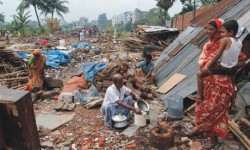Human Rights Watch
Slum eviction in Bangladesh: Seeking solutions
Md. Ashraful Alam & Shalina Akhter
(This is the concluding part of the story)
 |
Photo: guardian.co.uk. |
Illiteracy is another prime mover factor force people to migrate in city and to create slum. The literacy rate in village is so poor. People are not self motivated to work in own sphere due to lack of education .They do not know the inventory living hood in village. There is hundreds of opportunity to take their profession in village. But unfortunately they are deprived of them for having no education. The second arises if they had suitable and supporting measures in village to be self motivated worker in village, would they came in city to live in slum?
People run for none but for food, because they are hungry. This proverb is hundred percent truths if we think in the context of Bangladesh. Less production of crops due to traditional agriculture, natural disasters, and person having no means to get food look only food and food. They think only city can give them their bread and water. Their running begins in back of food to city and crates slum to live. The issue arises if they had adequate food or means to get food, would they come in city to live in slum?
Slum is a direct result of violation to right to housing itself. Low income, high price of raw materials and social exclusion are the common barriers towards the fulfillment of right to housing. Slums exist because poor people cannot afford the housing due to high price of housing equipment like land and housing markets. People who have no land or having no effort to buy land forced to occupy land that is not in demand, inappropriate or dangerous, such as land liable to flooding or landslides, railway embankments, canal banks and road verges. They are also forced to occupy as little space as possible, which leads to very high densities and unhealthy overcrowding. Alternatively, they are forced to settle on land at the periphery of towns and cities, beyond the urban infrastructure network and far from centers of employment where land is more accessible, if not affordable. It is proved that Slums are 'the products of failed policies, bad governance, corruption, inappropriate regulation, dysfunctional land markets, unresponsive financial systems, and a fundamental lack of political will.
So, it is clear that slum is a result of gross violation of human rights as well as slum itself is a reason for another reason for gross violation of human rights. Therefore, the following suggestions may be appropriate for the government. Government should not divide two types of rights in different considerations like giving more emphasize on civil and political rights, and neglecting ESC rights. It should take effective policy and measures to ensure the minimum enjoyment of economic, social and cultural rights along with civil and political rights. Wrong conception or exception should not be bore in mind of policy framer. Because, many policy makers opine that slums should be demolished because they embody all things negative (disease, crime, political unrest, ignorance etc.). Policy makers must get to grips with the alternative way for slum dwellers.
Resettlement is another solution to be done before eviction of slum. If they are not resettled properly, where will they go? There should be sufficient quantity of subsidized housing to meet the needs of all slum dwellers in building new house.
Public housing construction is another solution towards slum and slum eviction. There is a popular belief that governments should construct housing for urban low income groups. In this way the quality of housing can be ensured, as can the 'orderliness' of development. In order to make it affordable, however, both its initial cost of construction and its maintenance and management in use must be heavily subsidized. The governments should have either the political will or the resources to provide sufficient subsidy cover even a fraction of the need for new housing for low-income families. Nevertheless, government should have set out to pursue conventional housing policies resulting in the construction of estates of modern, finished housing units, and the establishment of financial systems to capture savings housing program. For example, In Europe where public housing schemes resettled large numbers of inner-city slum dwellers, the high-rise estates built at low costs are often associated with the social issues such as poverty and social exclusion, as well as poor physical environments and declining local economies.
Housing loans at free or low rate of interest is another solution to fill up the right to housing. This may be provided not only by the government but also by private sector institutions or by a public and private partnership.
A combine effective plan of government as well as NGO to a long term vision of city development based on integrated approach may be long time solution of slum and slum eviction.
A national legal and regulatory framework that stimulates the upgrading and provision of services for the poor should be adopted. This includes: land rights and land registration systems, technical standards for infrastructure, provisions that include small-scale operators, participatory planning recognized by formal master plans, responsibilities and incentives for ex-post monitoring, supervision and evaluation, and regulations for financial institutions that make it easier to cater to the poor.
So, we think it would be more rational for the government to take immediate initiatives to prevent the root causes for creating slum as under the preventive measures rather punitive. Because slum eviction is not solution unless and until these causes are uprooted. Rules, regulations and plans should be adopted which are favorable to the enjoyment of right to life, the hardcore of human rights.
The writers are Senior Lecturers, Department of Law, Uttara University.